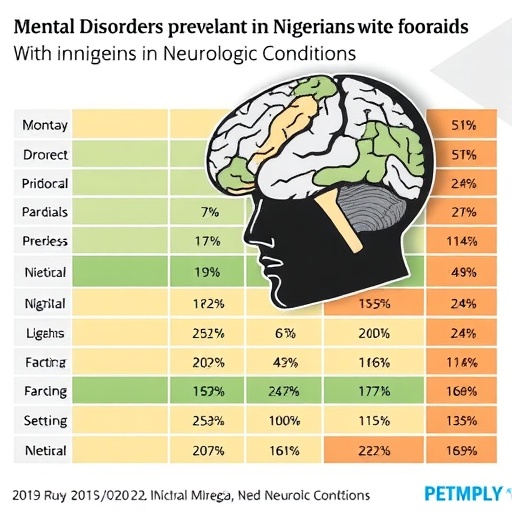In a groundbreaking systematic review published in BMC Psychiatry, researchers have unveiled critical insights into the intertwining prevalence of mental disorders among individuals with neurological conditions in Nigeria. This comprehensive study shines a light on the considerable psychiatric burden experienced by this population, emphasizing the urgent need for integrated healthcare approaches that address both neurological and mental health challenges simultaneously.
Neurologic conditions pose a significant health challenge worldwide, often accompanied by psychiatric comorbidities that complicate treatment and impact patient outcomes. In Nigeria, where neurological diseases and mental health disorders are both prevalent and undertreated, understanding the scale of this intersection is vital for enhancing public health strategies. This systematic review meticulously consolidates data spanning over a decade, from 2010 onward, revealing patterns that could transform clinical practice in the region.
The investigative team undertook a rigorous search across major medical databases including PUBMED, EMBASE, and African Journals Online to capture relevant studies examining the prevalence of psychiatric disorders among Nigerians with neurological conditions. By applying stringent inclusion criteria and employing meta-analytic techniques, they synthesized findings from 18 studies encompassing over 4,400 participants. This methodological rigor adds robust credibility to their pooled prevalence estimates.
Their analysis uncovered that approximately 17.6% of individuals with neurologic conditions in Nigeria suffer from major depression. This figure underscores a significant mental health crisis, given that depression is a leading cause of disability worldwide. The prevalence rate among this cohort demonstrates a mental health burden that is not only substantial but may also be under-recognized in clinical settings managing neurological diseases.
Further dissecting the data, the review highlighted that generalized anxiety disorder affects around 6.4% of people with neurological disorders in the region. While this rate is lower compared to major depression, it signifies a notable psychiatric morbidity that may exacerbate neurological illness progression and complicate treatment adherence. The distinction between these mental health conditions offers potential pathways for tailored intervention strategies.
Age and sex emerged as influential factors in the prevalence of depression among neurologic patients. The meta-regression analysis indicated that older individuals exhibited a significantly higher incidence of depression. Additionally, females were found to be more susceptible than males, aligning with broader epidemiological trends observed globally. These demographic nuances have profound implications for personalized mental health care and resource allocation.
Geographical disparities within Nigeria also presented an intriguing pattern; the southern regions reported higher prevalence rates of major depression compared to other regions. This geographic variation raises questions about the interplay of socio-economic, cultural, and healthcare access factors that might influence mental health outcomes in neurological patients. Further localized investigations could unravel these complex dynamics.
Delving deeper into specific neurological conditions, stroke survivors were identified as having the highest reported pooled prevalence of major depression, at nearly 27%. Stroke-induced disability and resultant lifestyle changes are known to precipitate depressive symptoms, making this finding consistent with global data but particularly alarming in a context like Nigeria, where stroke care infrastructure is evolving. The elevated depression rates among stroke survivors underscore the necessity for routine psychiatric evaluation in post-stroke rehabilitation.
People living with epilepsy in Nigeria displayed a pooled prevalence of major depression around 12%, a figure that reflects the global recognition of epilepsy as a neurological disorder with frequent psychiatric comorbidities. Notably, depression in epilepsy patients can not only diminish quality of life but also increase the risk of seizure exacerbation, creating a vicious cycle that complicates management. This data advocates for integrated neurological and psychiatric care pathways.
The study employed sophisticated statistical approaches, including random effects meta-analyses and assessment of heterogeneity via meta-regression, to ensure the reliability of results amidst variability among included studies. Their use of the NIH Quality Assessment Tool and the GRADE approach further validates the confidence levels attributed to the pooled prevalence estimates, reinforcing the importance of methodological exactitude in public health research synthesis.
Despite the demonstrated high heterogeneity in major depression estimates across studies (I² = 97%), the consistency of findings regarding demographic and geographic factors provides actionable insights for healthcare policymakers. These findings suggest tailored mental health screening and intervention programs could significantly improve overall outcomes for individuals with neurological disorders in Nigeria.
The systematic review’s conclusion poignantly calls for integrated care strategies that concurrently address neurological and psychiatric morbidities. This integrative approach aligns with contemporary calls in global health to dissolve silos between specialties, ensuring comprehensive patient-centered care, especially in resource-limited settings where both neurological and mental health resources are scarce.
This seminal work charts a critical path forward for Nigerian healthcare, emphasizing the dual burden of neurological and psychiatric disorders and advocating for policy reforms, increased mental health literacy, and infrastructural enhancements. As neurological disorders surge globally, the Nigerian experience shines as a microcosm of the broader challenge and opportunity to reconcile neurological and psychiatric healthcare for improved patient well-being.
With mental health increasingly recognized as inseparable from physical health, this study provides an essential evidence base that could galvanize further research, targeted interventions, and international support aimed at ameliorating the intertwined burdens faced by millions in Nigeria and similar contexts worldwide.
Subject of Research: Prevalence of psychiatric disorders among people with neurologic conditions in Nigeria.
Article Title: Prevalence of mental disorders among people with neurologic conditions in Nigeria: a systematic review.
Article References:
Yusuf, M.W., Abioye, A.I., Ademola-Popoola, O. et al. Prevalence of mental disorders among people with neurologic conditions in Nigeria: a systematic review. BMC Psychiatry 25, 1028 (2025). https://doi.org/10.1186/s12888-025-07327-9
Image Credits: AI Generated




